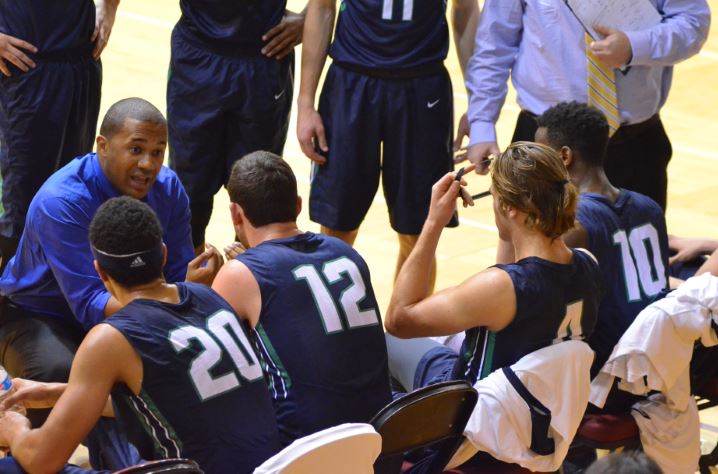Got Cough Drops?
Coach Michael Shelton guiding his team during a time out when playing a game at UMass.
Coaching is an occupation for the talker. Whether it is coaching Division I men’s college basketball or U6 girl’s softball, coaches are bound to raise their voices and yell in order to be heard. Vocal strain is a recurring, prominent issue for coaches that can cause permanent damage to their voices.
“You can do short-term damage and long-term damage,” said Dr. Michael Pitman, a laryngology (ear, nose, and throat) system leader for the Mount Sinai Health System in a New York Times article. “When you’re screaming, that trauma becomes really intense. So the vocal cords start to swell and inflame,” he notes.
The vocal cords of an average man vibrate 110 to 115 times per second. The average woman, whose pitch is higher, is nearly 200 times per second. When a coach raises his voice, it increases the collision forces between the vocal folds, resulting in greater trauma to the tissue. This damage can be irreversible.
Virginia Tech basketball coach Buzz Williams is a victim of voice damage. Five years ago at age 38, he was the coach at Marquette University. An alumna and current laryngologist contacted Williams after hearing him talk and suspecting voice damage. She offered to give him a nasendoscopy, and when she switched on the monitor with the camera in his throat, inflammation and other damage was found. He now has a spoonful of honey before each game and has learned how to yell from his diaphragm instead of his throat.
Michael Shelton, the Williston Boys Varsity Basketball coach, has had some minor troubles with his voice since he started his career.
“I think there are times where my voice feels strained a little bit, but no negative effects as of right now,” says Coach Shelton. When asked in an interview about any pregame preventive methods, Coach Shelton responded with the familiar chant, “It’s called, Ricola!”
Short-term effects of voice strain include local inflammation in the muscles that make up the vocal cords. This will cause a sore throat and a hoarse sounding voice, but his effects are only temporary, lasting for a couple of days at the most. If someone repeatedly misuses their voice on a daily basis, the vocal cords suffer more long-term damage and usually develop swellings or nodules.
Coach Jen Fulcher, known for her skills in coaching any sport and creating a winning team, defies all of these problems. And yes, she is by far the loudest!
“I have not had any big changes but at times after fall preseason my voice cracks a bit from over use. I have been lucky as I know many coaches that lose their voice every year,” said Coach Fulcher.
Coach Fulcher does not use the typical pregame methods—lozenges, lifesavers, or tea to prevent voice strain. Believe it or not, when asked what she drinks before a game, she says “Cokes and lattes – or perhaps I just use this as an excuse.”













